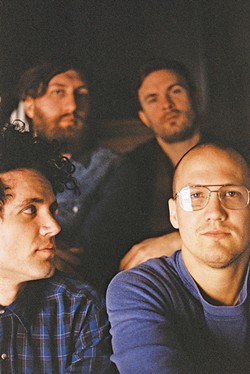When I began working on this piece, I started by writing a list of questions. My task was to give readers a primer on Provo's music scene, and I scrawled various questions that readers might want answered. I've covered the Provo scene for the past two years as a reporter at the Daily Herald, and before that, more informally, as a friend and fan of various Provo musicians. The ecosystem is intricate; how could I sum up my perspective (and it's only my perspective) in a single, succinct piece?
Well, I can't. But as my list of questions ballooned—things like "is the scene better than Salt Lake City's?" (probably) and "is it all Mormon?" (no)—I realized none of them quite mattered, nor did my ability to answer them here.
All those questions hinged on one. It was the final one I wrote down: "Should Salt Lake City even care about the Provo scene?"
The answer was not as obvious as I thought it might be.
Though much of it is genuinely praiseworthy, the most compelling thing about Provo's music scene—at least to me—isn't actually the music. At least, not directly. The scene's current narratives are so much broader, and on many levels way more existential. It's not just about a good song or album or band. These broader, deeper narratives are the things that are worth your attention. Just maybe.
It's only been two years, and my perspective has surely shifted, but things definitely felt different two summers ago. Imagine Dragons, which started in Provo, were riding the biggest of waves from its single "Radioactive," which was enjoying the longest run on the Billboard Hot 100 of any song ever: 87 consecutive weeks, finally ending in May 2014. Neon Trees (also Provo music alums) had two successful albums and a few hit singles under its belt. Local band Fictionist, signed to Atlantic Records, was working on its major label debut. The Moth & The Flame, probably the scene's most cherished darling at the time, had just moved to Los Angeles and was working with some big-timers out there. And not too long before all of that, Joshua James and Isaac Russell had gotten serious major label attention.
Big things had happened, big things were happening and it seemed big things were about to happen.
The initial success of James and Russell, followed by the rather meteoric success of Imagine Dragons and Neon Trees, and then the signing of Fictionist, fostered this idea within the music scene—whether conscious or otherwise—that local musicians would just get plucked up by the larger music industry. They would be given the resources to transcend whatever barriers might have once existed for Utah-based musicians. I somewhat expected my time at the Herald to be spent documenting similar rises to national prominence. In hindsight, it seems a bit naïve, but at the time, it wasn't far-fetched. The scene was on that kind of trajectory.
Then that trajectory changed. Imagine Dragons kept releasing successful music, though nowhere near the same degree as "Radioactive." Same goes for Neon Trees. Fictionist were dropped from Atlantic. The Moth & The Flame signed to Elektra, but their full-length follow up to their 2012 debut album still hasn't been released. A handful of other Provo musicians have enjoyed recent brushes with notoriety, but they've all been relatively minor by comparison.
The relevant narrative two summers ago—Provo-bred artists interacting with sizeable national audiences—was what many of us forecast as the dominant future narrative. The most pertinent story since then, though, hasn't been the music scene's interaction with a national audience. It's been the scene's interaction with the Provo community as a whole—and how, for the most part, they've both embraced one another to a surprising degree.
Further, it's about how this has undoubtedly changed both communities and the way they view/define themselves. And how those new identities aren't fully formed, or haven't been grown into, quite yet. Not an identity crisis, but an identity re-evaluation.
Is the Provo music scene about music? Well, yes. But it's about a lot of things these days.
It's about Utah Valley's unrelentingly entrepreneurial culture. It's about the changing role of counterculture. It's about the music industry's approach to aspiring artists. It's about lofty, raw ambition being challenged. It's about the deep-seated desire for recognition, within both the music scene and the larger Provo community.
The desire to be noticed, to be reckoned with, to be respected by the national community—yet still consider oneself separate from it—is quintessentially Utahn, isn't it? Indeed, it's at the root of Utah's pioneer history. What's happening in Provo isn't just Provo's story. It is a manifestation of Utah's ever-reoccurring story. And that is the reason why you should maybe care about the Provo music scene. Just maybe.
Part 2 in this series will run July 30.
Court Mann is a features reporter for the Daily Herald in Provo. Follow him on Twitter at @TheCourtMann.
More by Court Mann
-
Provo Music Primer Pt. 2
(Still) examining the Utah Valley scene
- Jul 29, 2015
- More »
Latest in Music
Readers also liked…
-
The Alpines Head North
Local band's debut concept album finds musical bliss in the apocalypse.
- Feb 7, 2024




